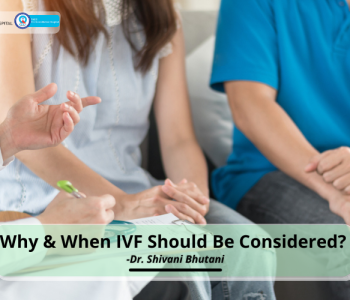 Eva Hospital
Eva Hospital
Why & When IVF Should Be Considered?
More successful than intrauterine insemination or IUI, IVF is a very popular assisted reproductive technique (ART). In this l fertility procedure, any type of infertility problem can be solved, both male and female factors.
The process of in vitro fertilization involves stimulating the ovaries to produce multiple eggs at once, retrieving them from the mother, fertilizing them in-vitro(in the lab) with the father’s sperm, and implanting the resulting embryos into the mother’s or a surrogate’s womb.
Unlike IUI, which relies primarily on the natural process of ovulation and conception, IVF can tackle many issues including genetic screening of sperm and embryos.
Why & When Should You Consider IVF
In vitro fertilization can resolve all the following issues:-
- Blocked fallopian tubes
- Pelvic inflammatory disease
- ovulation disorder
- Poor sperm quality
- Endometriosis
- Uterine fibroids
- Advanced age of mother
- Unexplained infertility
When Should You Consider IVF?
Is it too soon? Is it too late? What are the right age and stage to go for IVF?
- Well when you have tried less invasive treatments and therapies and have not succeeded, IVF is your best shot.
- When you are undergoing treatment for a serious disease and want to preserve your fertility.
- When you do not want to waste precious time in trying treatments that may not work.
Why Should You Consider IVF?
You should give a test tube baby a thought because it includes fertility treatments that handle the problems in both the female’s egg, uterus, and the male’s sperm.
IVF done once can make future pregnancies less invasive and conception very fast. It is because you can preserve the extra embryos from in vitro fertilization and use them when you are planning your next child.
The Advantages & Disadvantages of IVF
IVF has a very high rate of success compared to the other fertility procedure: IUI- intrauterine insemination. It provides a solution to a wide range of infertility issues and also provides the option of genetic testing of embryos.
In the IVF technique, you can also avoid multiple births by using a single embryo transfer. Furthermore, in the long run, it is a much quicker way of getting pregnant as there is no waiting period involved.
Also, has the advantage of planning more than one pregnancy. For couples who want more babies after the first test-tube baby, it has the advantage of freezing the embryos that remain unused. The frozen embryos can be stored and preserved to get pregnant in the future and have more children.
You may consider it a disadvantage that it requires more commitment from both the parents. While IUI requires only minimal ovarian stimulation, a little amount of monitoring & an in-office procedure of insemination.
IVF, on the other hand, needs very strong stimulation for the ovaries via fertility drugs, everyday monitoring, the egg retrieval process using mild anesthesia, fertilization of eggs, and embryo growth in the embryology laboratory, followed by implantation or Embryo Transfer to the uterus.
There is also the simultaneous process of preserving the extra embryos.
Nevertheless, all the above procedures are followed and taken care of by your doctor and her team. Dr. Shivani Bhutani likes to make sure there is no burden or stress on the intended parents for any of the technicalities involved. The entire cycle is smoothly managed and monitored by her personally.
Which Decisions Do You Need to Make?
After discussions with your infertility specialist, as a couple, you will decide whether or not you want to try IVF. The factors you will consider are age, fertility evaluation & family history.
If the odds are not in your favor, you may consider using donor eggs or sperm. Surrogacy is an option too. The infertility Hospital like Eva aids you in obtaining all of these, including arranging for a surrogate if you do not have someone.
The doctor will help you decide whether you should get:
- pre-treatment genetic testing of mother and father
- The types of treatment cycles
- The number of embryos to implant- multiple births
- Whether you should freeze any embryos
Also read: The Importance of IVF and The Possibilities it Offers
When Should You Opt Straight for IVF?
Couples can go straight to IVF when the likelihood of pregnancy with IUI is low but relatively higher with IVF. This is recommended in the cases of fallopian tube damage, severe endometriosis & pelvic adhesions along with the existence of male infertility factors.
Additionally, for women who are past the high fertility age, or have decreased ovarian reserve, a need for genetic testing, or a surrogate, going straight away to IVF is a good idea.
Discuss
The decision for IVF should be made by every patient in consultation with their infertility specialist Ludhiana. An experienced doctor and established clinic can furbish all kinds of treatment.